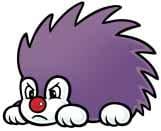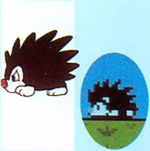Porcupo
- Not to be confused with Porcupal.
| Porcupo | |||
|---|---|---|---|
 Artwork from Super Mario Advance | |||
| First appearance | Yume Kōjō: Doki Doki Panic (1987, overall) Super Mario Bros. 2 (1988, Super Mario franchise) | ||
| Latest appearance | Ultimate NES Remix (2014) | ||
| |||
Porcupos are small, spiked creatures first appearing in Yume Kōjō: Doki Doki Panic and Super Mario Bros. 2. They are occasionally called porcupines but have a greater resemblance to hedgehogs as indicated by their Japanese name.
History
Super Mario series
Yume Kōjō: Doki Doki Panic / Super Mario Bros. 2
Porcupos are enemies in Yume Kōjō: Doki Doki Panic and Super Mario Bros. 2. They pace back and forth and are usually in groups of two or more. They cannot be jumped on or picked up, so players must throw other enemies or objects at Porcupos to defeat them. Unlike other enemies, Porcupos have a four-frame walking animation, made by moving the front two 8x8 pixel tiles around, thus also using only half as many actual graphics as most other enemies. Their artwork shows them with white faces and red noses, though in game, they have tan faces and gray noses instead, despite how the artwork's colors would be mapped accurately to the game's red palette. Additionally, they have visible ears, which are not shown in their artwork. Their feet are also colored the same as their body in their original sprites, though the original game's manual depicts a screenshot of one with tan-colored feet (likely from a prototypical build). In the Super Mario All-Stars and Super Mario Advance remakes, Porcupos are purple and have a two-frame walk animation with separate sprites, like most other enemies.
Super Mario Advance 4: Super Mario Bros. 3
Porcupos are enemies in Super Mario Advance 4: Super Mario Bros. 3. They are encountered in Ground Work. Porcupos are recolored a shade of blue.
The Super Mario Bros. Super Show!
A single Porcupo appears in The Super Mario Bros. Super Show! episode "On Her Majesty's Sewer Service" as the pet of Koopfinger. When Mario and Luigi invade Koopfinger's hideout, the Porcupo simply hops off Koopfinger's lap and runs away instead of trying to fight.
Mario Kart 64
Porcupines,[1] alternatively called Spinys,[2][3] are obstacles in Mario Kart 64. In this game, porcupines have more pronounced spines, a blue face, beady eyes, and brown legs. They are encountered in Yoshi Valley, sidling back and forth in the middle of the road in certain paths. Any rather who touches a porcupine will have their kart spin out out contact. The porcupines do not return in the Mario Kart 8 rendition of the course, being replaced with Goombas instead.
Profiles and statistics
Super Mario Bros. 2
- Instruction booklet description:
- English:
His body is entirely covered with spines so you can't jump on his back.[4]
- English:
Super Mario Advance
- Instruction booklet description:
- English (British):
These annoying creatures are covered in spines, so jumping on them is not the best solution.[5]
- English (British):
Perfect Ban Mario Character Daijiten
Gallery
- For this subject's image gallery, see Gallery:Porcupo.
Super Mario All-Stars (Super Mario Bros. 2)
Names in other languages
| Language | Name | Meaning | Notes |
|---|---|---|---|
| Japanese | ハリマンネン[6][7][8] Harimannen |
Portmanteau of「 |
|
| ポーキュッポ[7][9] Pōkyuppo |
Transliteration of the Super Mario Bros. 2 name | ||
| Chinese | 刺毛[10] Cìmáo |
Spike furred | |
| 豪猪[11] Háozhū |
Porcupine | ||
| German | Igel[?] | Hedgehog | |
| Italian | Porcupo[12][13][14] | Same as English, also likely a portmanteau of porcospino ("porcupine") and cupo ("gloomy") | |
| Porcupì[15] | Clipping of "porcupine" | ||
| Korean | 고슴이[?] Goseumi |
From "고슴도치" (goseumdochi, hedgehog) and the Korean noun-deriving suffix "~이" (-i) |
References
- ^ Nintendo (1997). Mario Kart 64 English instruction booklet. Nintendo of America (American English). Page 32.
- ^ Owsen, Dan, Scott Pelland, and Paul Shinoda (1997). Mario Kart 64 Player's Guide. Nintendo of America (American English). Page 70, 71, 73, 78.
- ^ Mario Kart 64: Yoshi Valley. nintendo.com (American English). Archived February 24, 1998, 19:38:15 UTC from the original via Wayback Machine. Retrieved August 4, 2018.
- ^ Nintendo (1988). Super Mario Bros. 2 instruction booklet (PDF). Nintendo of America (American English). Page 25.
- ^ Nintendo (2001). Super Mario Advance instruction booklet (PDF). Nintendo of Europe (British English). Page 12.
- ^ Nintendo (1987). Yume Kōjō: Doki Doki Panic instruction booklet. Nintendo (Japanese). Page 33.
- ^ a b Nintendo (1993). Super Mario USA instruction booklet (PDF). Nintendo (Japanese). Page 28.
- ^ Nintendo (1996). マリオカート
64 (Mario Kāto Rokujūyon) instruction booklet (PDF). Nintendo (Japanese). Page 32. - ^ Perfect Ban Mario Character Daijiten. Page 225.
- ^ From the ending scenes of Super Mario Advance as localized by iQue. Reference: 无敌阿尔宙斯 (August 28, 2013). 神游 超级马力欧2敌人官译. Baidu Tieba (Simplified Chinese). Archived February 26, 2017, 16:11:09 UTC from the original via Wayback Machine. Retrieved July 20, 2024.
- ^ 马力欧卡丁车 (Mǎlì'ōu Kǎdīngchē) instruction booklet. iQue (Simplified Chinese). Page 32.
- ^ Super Mario Bros. 2 Italian manual. Page 25.
- ^ Super Mario All-Stars Limited Edition Italian manual. Page 38.
- ^ November 15, 2018. Super Mario Bros. Enciclopedia. Magazzini Salani (Italian). ISBN 889367436X. Page 68.
- ^ Super Mario Advance European manual. Page 112.





